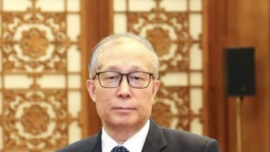For the first 10 months of the year, China’s trade surplus with the U.S. was $223 billion according to Bloomberg calculations based on data released by the General Administration of Customs on Wednesday — just before the U.S. president arrived in Beijing from Seoul. That pace should mean the full-year gap between China’s sales to the U.S. and its imports is about the same as in 2016, at around $250 billion.
While China, the U.S., and the International Monetary Fund all calculate the data differently, it’s clear that Trump’s time in office hasn’t coincided with any great shift in the balance of trade between the two economies, despite his entreaties. The deficit “has to come down,” Trump said on Monday, commenting after the start of an Asian tour dominated so far by security and trade issues.
“The bilateral trade balance remains tilted in China’s favor,” Bloomberg Economics Chief Asia Economist Tom Orlik said in a note. “Expectations that the Trump trip with do anything to fix the problem are low.”
China’s trade data published Wednesday showed:
Exports increased 6.9 percent in dollar terms in October from a year earlier Imports advanced 17.2 percent year-on-year The total trade surplus was $38.2 billion
Amid rumblings such as the U.S. investigation into abuses of intellectual property by China and a spat over aluminum foil imports, there’s little sign of a full-scale trade war afoot. Instead, buoyant global growth is driving demand for Chinese exports, while a broader shift to a consumption-driven economy at home is supporting import growth.
“External demand is holding up and the steadiness will likely continue into the next year,” said Yao Shaohua, an economist at ABCI Securities Co. in Hong Kong. “China will likely boost its imports from the U.S. as a result of the Trump talk, while keeping the exports to the U.S. stable.”
For its part, China says it is making efforts to increase its imports from other nations, at a time when the domestic economy is shifting toward a consumption-driven model. Commerce Minister Zhong Shan this week laid out a list of measures being undertaken in that regard, including the first ever trade fair in the country dedicated to imports.
“China does not deliberately seek a trade surplus,” Zhong said in response to questions from Bloomberg News. “It is a result of market competition. Though China makes its name for trade surpluses, it is more than China that benefits from them.”























